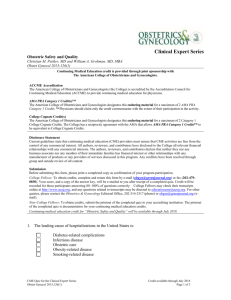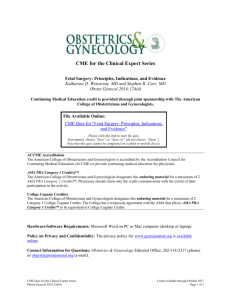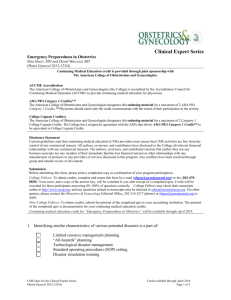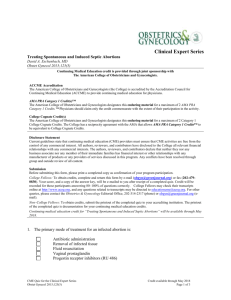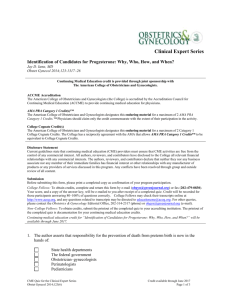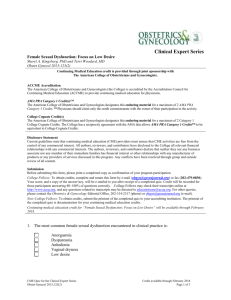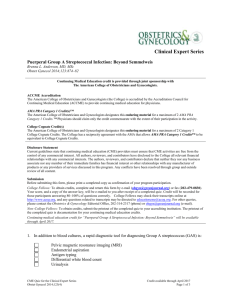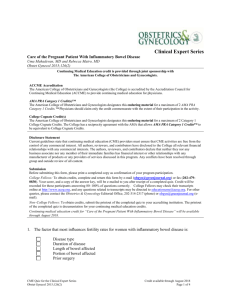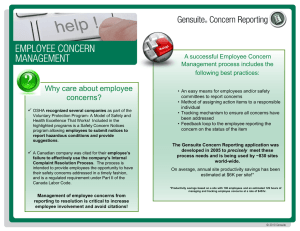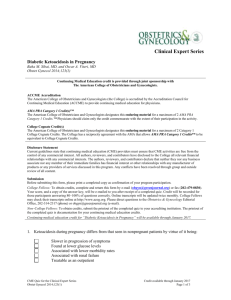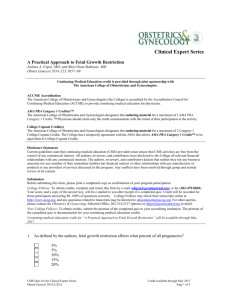Recommendations for Follow
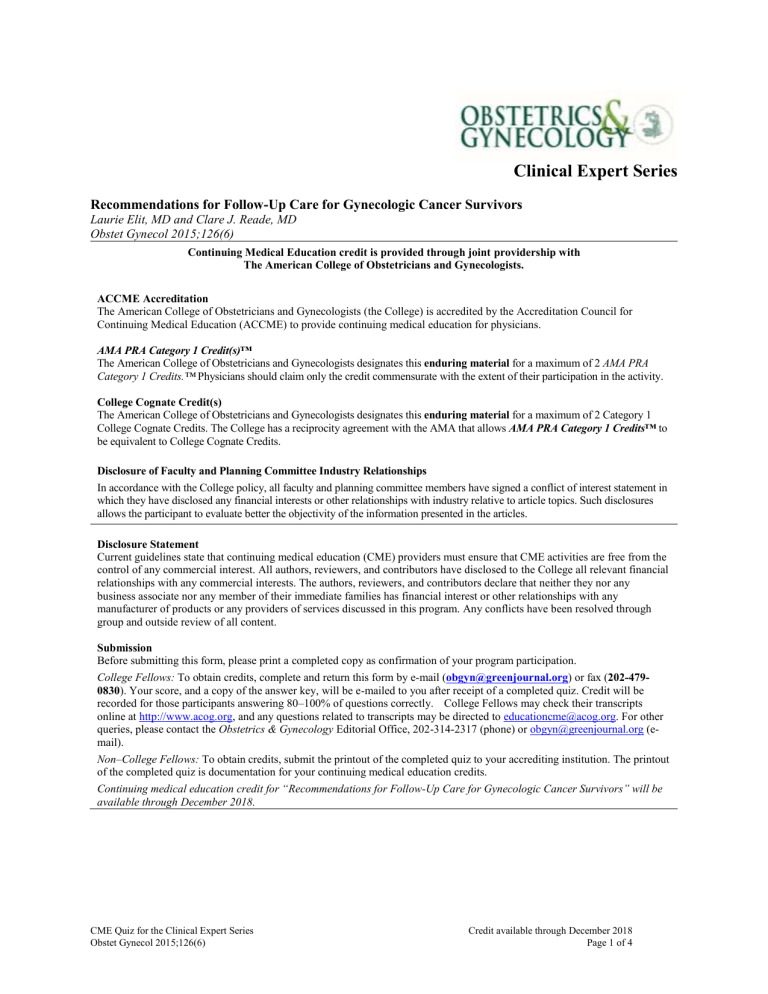
Clinical Expert Series
Recommendations for Follow-Up Care for Gynecologic Cancer Survivors
Laurie Elit, MD and Clare J. Reade, MD
Obstet Gynecol 2015;126(6)
Continuing Medical Education credit is provided through joint providership with
The American College of Obstetricians and Gynecologists.
ACCME Accreditation
The American College of Obstetricians and Gynecologists (the College) is accredited by the Accreditation Council for
Continuing Medical Education (ACCME) to provide continuing medical education for physicians.
AMA PRA Category 1 Credit(s)™
The American College of Obstetricians and Gynecologists designates this enduring material for a maximum of 2 AMA PRA
Category 1 Credits.™ Physicians should claim only the credit commensurate with the extent of their participation in the activity.
College Cognate Credit(s)
The American College of Obstetricians and Gynecologists designates this enduring material for a maximum of 2 Category 1
College Cognate Credits. The College has a reciprocity agreement with the AMA that allows AMA PRA Category 1 Credits™ to be equivalent to College Cognate Credits.
Disclosure of Faculty and Planning Committee Industry Relationships
In accordance with the College policy, all faculty and planning committee members have signed a conflict of interest statement in which they have disclosed any financial interests or other relationships with industry relative to article topics. Such disclosures allows the participant to evaluate better the objectivity of the information presented in the articles.
Disclosure Statement
Current guidelines state that continuing medical education (CME) providers must ensure that CME activities are free from the control of any commercial interest. All authors, reviewers, and contributors have disclosed to the College all relevant financial relationships with any commercial interests. The authors, reviewers, and contributors declare that neither they nor any business associate nor any member of their immediate families has financial interest or other relationships with any manufacturer of products or any providers of services discussed in this program. Any conflicts have been resolved through group and outside review of all content.
Submission
Before submitting this form, please print a completed copy as confirmation of your program participation.
College Fellows: To obtain credits, complete and return this form by e-mail ( obgyn@greenjournal.org
) or fax ( 202-479-
0830 ). Your score, and a copy of the answer key, will be e-mailed to you after receipt of a completed quiz. Credit will be recorded for those participants answering 80–100% of questions correctly. College Fellows may check their transcripts online at http://www.acog.org
, and any questions related to transcripts may be directed to educationcme@acog.org
. For other queries, please contact the Obstetrics & Gynecology Editorial Office, 202-314-2317 (phone) or obgyn@greenjournal.org
(email).
Non–College Fellows: To obtain credits, submit the printout of the completed quiz to your accrediting institution. The printout of the completed quiz is documentation for your continuing medical education credits.
Continuing medical education credit for “Recommendations for Follow-Up Care for Gynecologic Cancer Survivors” will be available through December 2018.
CME Quiz for the Clinical Expert Series
Obstet Gynecol 2015;126(6)
Credit available through December 2018
Page 1 of 4
1.
The main goals of cancer follow-up care is to:
Detect new onset malignancies
Detect recurrent disease
Manage therapy-related symptoms
Provide emotional support
Provide well-woman care
2.
If a cancer recurrence is detected in a location not amenable to curative therapy, the advantage of early detection is to:
Allow for end-of-life planning
Control the costs for further treatment
Delay the onset of disease-related morbidity
Enable psychological support to be planned
Reduce the need for further testing
3.
A recent survey of patients participating in follow-up after curative intent cancer therapy found that the most frequently cited unmet need of patients was:
Financial planning
Metachronous cancer surveillance
Psychological support
Recurrence therapy planning
Well-woman care
4.
Upon completion of initial cancer treatment, continuing surveillance should include a history, physical examination, and:
Complete blood count
Fecal occult blood testing
Pelvic ultrasonography
Renal function testing
Screening for anxiety and depression
5.
A 56-year-old was recently treated for stage II endometrial cancer. The most appropriate follow-up at
6-months should include:
Computed tomography of the pelvis
Cytology testing of the vaginal apex
Inspection and palpation of the vaginal apex
Serum CA-125 testing
Transvaginal ultrasonography
CME Quiz for the Clinical Expert Series
Obstet Gynecol 2015;126(6)
Credit available through December 2018
Page 2 of 4
6.
In endometrial cancer survivors, follow-up counseling should specifically include:
Avoidance of phytoestrogens
Cardiovascular health
Cholesterol reduction
Maintenance of adequate hydration
Weight gain
7.
For patients treated for ovarian cancer, the most appropriate periodic follow-up is:
Computed tomography of the pelvis
Positron emission tomography-computed tomography (PET-CT)
Serum CA-125 testing
Symptom monitoring
Transvaginal ultrasonography
8.
A 64-year-old woman underwent radiation therapy for cervical cancer 12 months ago. A follow-up cytologic examination of the cervix reports atypical squamous cells of undetermined significance
[ASCUS]. There is no visible lesion. The most appropriate next step in the management of this patient is:
4-quadrant biopsy of the cervix
Computed tomography of the pelvis
Follow-up in one year
Human papillomavirus co-testing
Referral for colposcopy
9.
An important component of follow-up care specifically for women with vulvar or vaginal cancer is:
Cardiovascular health
Colon cancer screening
Positron emission tomography-computed tomography (PET-CT)
Smoking cessation
Weight reduction
10.
Based upon the data given by the author, a cancer survivor who presents for follow-up is most likely to have been treated for cancer of the:
Cervix
Ovary
Uterus
Vagina
Vulva
CME Quiz for the Clinical Expert Series
Obstet Gynecol 2015;126(6)
Credit available through December 2018
Page 3 of 4
College ID Number:
Name:
Address:
City/State/Zip:
E-mail Address:
Actual time spent completing this activity (you may record up to 2 hours):
CME Quiz for the Clinical Expert Series
Obstet Gynecol 2015;126(6)
Credit available through December 2018
Page 4 of 4
